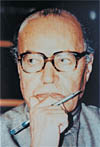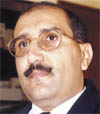Ikhlas Al-Qirshi: “There is no doubt that a new political system is now taking shape in our society.” [Archives:1998/25/Interview]
Ms. Ikhlas Abdul-Habib Al-Qirshi is an archeologist by training. But she has become a well-known TV personality. Born in Aden, Al-Qirshi spent a great part of her life in Egypt, returning to Yemen to finish her university studies and get a BA in archeology from Sanaa University in 1988.
In addition to her work as a TV announcer, she is also the secretary-general of the Society for Creative Yemeni Women and a founding member of the Business and Professional Women Club.
Ms. Al-Qirshi is a good example of a new breed of gutsy and dynamic Yemeni women, who are making in-roads into a world that is run as an exclusive male club. More and more Yemeni women are entering this world by carving out a place for themselves in media, business, finance, and other professions.
But the job of a career woman is not done. She also has to attend to her home. Ikhlas is also a successful mother.
Mohammed Bin Sallam of Yemen Times discussed with Ms. Al-Qirshi various crucial issues concerning the progress of female emancipation and advancement within Yemeni society.
Q: Since you are an archeology major, how did you get involved with television?
A: It has been my most cherished dream and ambition to work as a TV announcer. This ambition did not come as a mere desire to be famous, but out of a real conviction of the importance of this vital medium in our lives.
For the majority of people who read little or have not much to do by way of recreational activities, television represents a great source of information and entertainment, exerting a huge influence on the way we lead our lives, right down to the way we eat and dress.
Out of my conviction of the TV’s marked influence on the people’s daily life, I always longed to work with it. My dreams have come true.
Q: How did you actually start working in the TV?
A: I applied to the relevant authority, and was able to successfully pass the screening tests for TV announcers in 1984. I was then only in my first university year.
In addition to working as an announcer, I also prepared and presented women’s and family programs. I then progressed to preparing and presenting news casts, covering major events, and to lead discussion and political analysis programs. Last but not least, I used also to present the ‘Good Morning Yemen’ program.
Q: How do you evaluate the role of the media in changing women’s conditions and traditional image in Yemeni society?
A: I am afraid that the media play a rather marginal role in this issue. The subject of women liberation and development is a sensitive one, and needs to be tackled with candor and honesty. There is a very slow change in this regard. Why?
Because the people responsible for running the official media in this country, whether men or women, have no clear policy on how best to address women’s issues and change wrong beliefs and outdated traditions. What is presented to women does not go beyond a few erroneous generalizations. It is noticed that very little time is allocated to women’s programs.
Q: Has the Yemeni satellite TV channel been able to achieve a good status among other Arab channels?
A: Generally speaking, the media in Yemen have not been able, up to now, to really employ the great advances in communication achieved during the past few years. We still live in pre-communication, revolution times.
The laws governing the media try to limit creativity and independence. Moreover, material and human resources are still unable to cope with the rapid changes taking place in the world media. This also applies to other Arab countries, not only Yemen.
The Yemeni satellite TV channel was supposed to produced a qualitative leap forward. But, unfortunately, it is still unable to present itself in a proper way, let alone showing the real cultural and artistic creations of Yemen.
Q: An increasing number of Yemeni TV and radio announcers and technicians are leaving to work in other Arab TVs. What do you think is the reason?
A: Going to work in another country in itself is not a bad thing since people can benefit from the experiences of others. However, Yemeni TV and radio workers leave for a number of reasons:
1- There is a marked lack of facilities to develop people’s talent and creativity. Also, there is not even a limited margin of freedom to allow for honest competition and self-realization.
2- Small wages and bureaucracy are major repelling factors.
There are other factors that frustrate people whose spirit rive to seek work abroad.
Q: Why have you absented yourself from the small screen, and not have sought work abroad?
A: I was forced to leave with no real justification, which came as part of the twisted methods of harassment to put down successful people, in addition to the factors I mentioned previously.
Q: You were connected with the BBC team that was arrested in Yemen recently. Could you tell us about that?
A: The story was published by several newspapers. It suffices to say that the three BBC men were acquitted by court in a just and fair decision that took into consideration the freedom brought about by the rapid developments of world media and communication systems. I cannot understand why some people created all that uproar about this case, in the first place.
Q: Let’s now move to more general concerns. Do you think that Yemen’s current political experience can produce a real qualitative leap in the people’s life?
A: There is no doubt that a new political system is now taking shape in our society. It is only logical that we should review the bases on which the Yemeni society is established so that there will be more harmony between what reality and aspiration.
Reviewing the situation must be done in a constructive and honest way, aiming to “prune” and rectify. There should be a more careful re-evaluation and assessment of the current laws, legislations, institutions and those responsible for them. Only in this way can we build sound society base on the principles of freedom, justice, rationality, peace, and faith.
Q: How do you view what has been achieved so far?
A: What has been accomplished up to now indicates that positive efforts are being made towards allowing more popular participation in public life and decision making. It is just the beginning of a long and arduous journey. All possible shortcomings will have to be promptly identified and properly addressed.
Q: How do you evaluate Yemen’s democratization process, so far?
A: It is not easy to successfully start practicing democracy immediately after a long period of a totalitarian one-party rule. Although the ruling authority has its own methods and views; nevertheless, the concept of democracy is gradually taking deeper and deeper roots into the people’s mentality and daily practices.
However, holding parliamentary elections is not enough to say that democracy is now a fact of life or that we have been able to remove all traces of the past. A new style of thinking and interaction is needed to replace the old ways. It is a very difficult task to uproot the totalitarian concepts or primitive instincts of power, selfishness, and domination.
Democratization, on the other hand, bases itself on the power of the mind, and requires many sacrifices and a long, hard process of re-education. Only in this way can the mind and the rational dialogue overcome the language of violence brute force.
All national and international indicators show that the future is for democracy not only as a method of governance, but also as a way of live in the economic, cultural, political and social spheres. Yemen is the first among its neighbors to follow this path.
Q: What about women’s role in all these developments?
A: Circumstances as a certain period in time have enabled a small number of women to occupy prominent positions and acquire big roles in public life. However, similar circumstances but in a different period have failed to provide ample opportunity for a large number competent and highly qualified women. These new women work silently but efficiently throughout Yemen, without asking for any rewards. They do not have the chance to be publicly known, despite their great accomplishments.
Thus, it is circumstances and period differences that cause the marginalization of women. We, nevertheless, hope that the new breath of democracy, freedom, justice and equality in Yemen will enable the these women to receive their due share of moral and material credit. They must be given a larger opportunity to better serve their country and people.
——
[archive-e:25-v:1998-y:1998-d:1998-06-22-p:./1998/iss25/intrview.htm]


